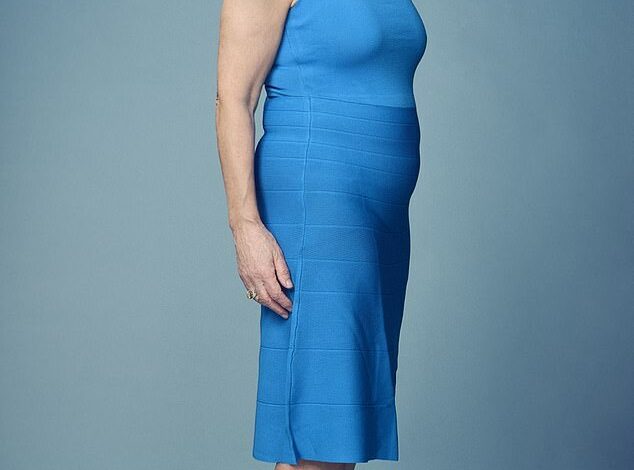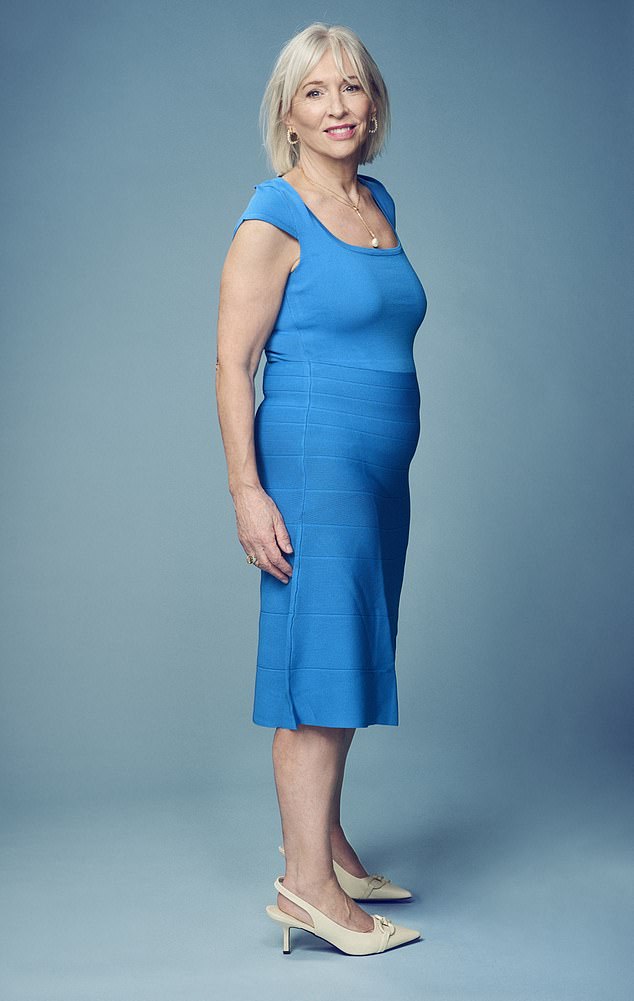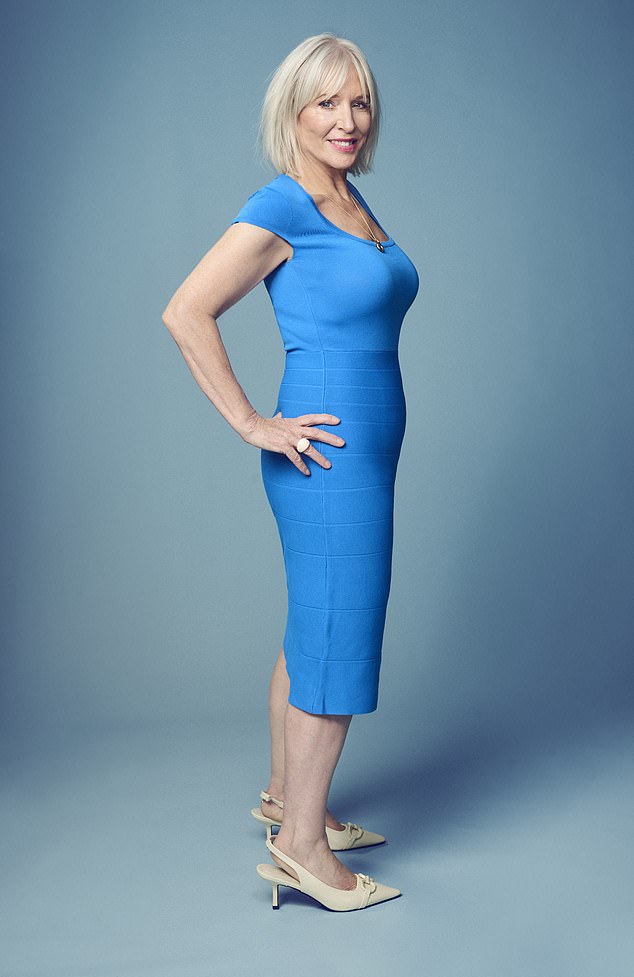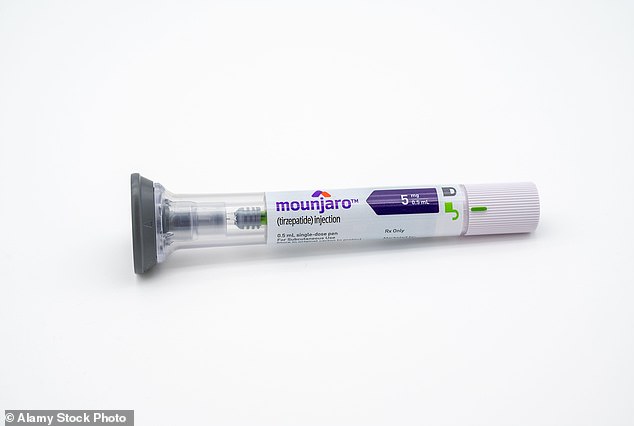Nightmares, fainting and ‘Ozempic face’. What happened during my month on a weight loss jab isn’t for wimps – but oh joy you lose weight like a 20-year-old, says NADINE DORRIES




Over the past two years, I have received four telephone calls from my GP that I would rather have done without.
The first was when I was 65, still Culture Secretary and sat in the back of a ministerial car on my way to a meeting. My doctor was blunt and to the point: ‘You are pre-diabetic, it’s not the best result, though you are only just in the pre-zone.’
Her advice was to lose weight as soon as possible — ‘at least 12lb’ — and to alter my diet. This took me by surprise as I would have described myself as a fairly healthy eater. I rarely ate red meat, avoided ultra-processed food and cooked from scratch when I was at home.
But I knew that standing at not much over 5ft tall and weighing 11st 3lb, things weren’t right. The truth is, I had never fully shed the baby weight from 30 years ago and the bathroom scales tended to swing up and down. My wardrobe was full of clothes I couldn’t fit into, and I cringed at photographs of myself.
But how on earth was I going to lose weight when I barely had control of my own diary or diet? I worked extremely long hours, in a high-stress job. I lived most of the week away from home and ate on the hoof, sometimes late at night and often takeaway hot food.

Nadine Dorries before she made the decision to jump on the Ozempic bandwagon – her excess weight was mostly around her middle
But that phone call alarmed me. I had to do something. It wasn’t easy to shed the extra weight. If I wanted to lose 4lb in my 20s, I could do it in a week. Those days had long gone.
So I altered my lifestyle.
When I worked on a documentary with the late Michael Mosley, he gave me copies of his books. In the foreward of one, I read the following: ‘All disease begins in the gut.’
I took that to heart and ate lots more fruit and vegetables, cut down on chocolate and didn’t let a cake or biscuit pass my lips. I also gave up sugar in my morning coffee and only had wine at weekends. The half bottle of wine a night became a thing of the past.
Five months of hard work later — and I mean very hard work — a repeat blood test result showed I was no longer in the realms of ‘pre-diabetes’ and was now down to 10st 5lb. I assumed I would continue to lose weight, but I didn’t. The scales stuck stubbornly at 10st 5lb no matter what I did.
‘It’s your age,’ my daughters helpfully volunteered.
Plus, there was always something to get in the way — a celebratory event, a weekend away or a holiday, and the needle on the scales failed to move. I was reassured that I wasn’t putting weight on, but frustrated that I wasn’t losing any more.
Then came the next phone call after a routine blood test: I had non-alcoholic fatty liver disease — a build-up of fat in the liver common in the obese and overweight, which can lead to more serious damage later.
‘But I have lost weight,’ I told my doctor.
Not enough, it transpired — my BMI was still a long way out of the normal range. The graphic on the NHS website is very clear. If you are in the green zone, you are a healthy weight; amber, overweight; red, obese.
I was at the wrong end of the amber scale, closer to red, and the website told me I should weigh between 7st and 9st 6lb. I had two more stone to lose.
‘Do better,’ was the thought running through my mind as I put down the phone.
So about nine months ago, I joined a gym and went religiously every single week, signed up to Pilates and yoga classes and took on the dog walking — and still, the dial on the scales didn’t move.
I was 66 and the challenge to lose those 28lb was daunting. The trouble was, I still hadn’t confronted my real problem. No matter how many steps I walked or spinning classes I took, nothing was going to work until I stopped indulging in so many treats.

Nadine after she started taking weight-loss jabs – she says she was back to ‘losing weight like a 20-year-old’
You see, my household revolved around entertaining and food; food is a joy and there was nothing I loved more than trying out new recipes and feeding others. By the time the third call came, I wondered if I should put my doctor on my Christmas card list. Maybe I should invite her around for a meal?
‘Your cholesterol is high,’ she said, ‘we need to put you on statins.’
It did cross my mind that maybe we should stop doing the blood tests which kept on returning the doomsday results.
However, being a trouper, I picked up the prescription and began taking cholesterol-lowering Atorvastatin, at 20mg a day.
I hated doing this. I have an aversion to taking any medication and, if I’m honest, I felt like a total failure. I had now left Westminster and thrown myself full-time into life as a novelist and a columnist for this paper, which meant many hours sat at a desk either reading, researching or writing. Surely I now had the time to take myself in hand…
Then came the fourth call, the one that finally persuaded me I had to do something drastic.
‘We need to double your statins,’ said the voice of Dr Doom. ‘Your cholesterol is still high — the 20mg isn’t working as well as I’d hoped.’
I had now become the grandmother I never wanted to be, the one who had to remember to take her tablets. The one who keeps on trotting back to the doctor for repeat blood tests and another ticking off. And the longer I failed to shift those spare couple of stone, the more damage they would do to my health.
The excess weight was mostly around my middle — I hid it well — and that has particular consequences, including making you more vulnerable to certain cancers along with a host of ailments that shorten your life span.
But I have a granddaughter, almost three years old, who is my world and I could think of nothing in my life which would bring me greater happiness than watching her grow up.
And so I made the decision — I would jump on the Ozempic bandwagon. Spending a fair amount of time in TV studios, I had seen how well it worked on others and had been impressed.
I knew Ozempic (semaglutide) was only licensed as a medication for type 2 diabetes, and that if I were to buy an injectable treatment from a High Street pharmacy, the two drugs I would have to choose from would be Wegovy (also semaglutide) and the recent addition to the stable of weight-loss jabs, reported to be more effective, Mounjaro (tirzepatide).
I felt so embarrassed about reaching this point of helplessness.
To order online from the pharmacy I used, Simple Online Pharmacy, was easy and user friendly, but detailed. They required my height and weight, proof of my ID, my body measurements, a completed health questionnaire, my GP’s details, and a photograph to prove I was carrying the extra weight I claimed.
Having passed their checks, and paid £153, the first month’s supply arrived a few days later in a refrigerated package I had to sign for.
I was sent reams to read and clear instructions, which I pored over. I’d met a lady who was on Wegovy who hadn’t attached the needle to the pen properly and for the first month had wondered why, every time she injected herself, the fluid in the pen ran down her leg and she wasn’t losing weight.

Like Ozempic, Mounjaro suppresses appetite and stops you thinking about food, meaning you lose all interest in it and eat far less than you would normally
My first dose was 2.5 mg per week, administered via a subcutaneous injection — not a problem for me as a former nurse. I would spend a month on this dose, which aims to get your body used to the drug. Each month, you move up to a slightly higher dose.
I was suddenly overcome by an intense trepidation. I was knowingly injecting myself with a drug some people said made them vomit and incapacitated with nausea and diarrhoea. What was I doing?
But then I had a word with myself. I had to power through these nerves if I was to put my BMI into the green, lower my cholesterol, and improve my chances of being there for my granddaughter as she grew up. At 10.30pm one night, before I went to bed, I plunged the needle into the gripped fat of my belly.
It was painless. If waxing your legs on a pain scale of 1 to 10 is a 10, this was -1. And yet, with the benefit of hindsight, I realise the timing was a big mistake.
Mounjaro is the brand name for tirzepatide, a drug that activates two receptors — GLP-1 (which Ozempic also targets) and another called GIP — which slows the rate at which food is digested and lowers blood sugar. Like Ozempic, Mounjaro suppresses appetite and stops you thinking about food, meaning you lose all interest in it and eat far less than you would normally.
But taking it last thing at night gave me a horribly unexpected side-effect — a terrible nightmare that woke me, drenched in sweat and awash with a nebulous fear, at 2am. I slept fitfully until 5.30am — and then woke again desperate for the loo. My first symptoms had arrived a lot sooner than I expected.
A few hours later, I got up properly, feeling groggy, light-headed and out of sorts. I was on breakfast duty and my granddaughter asked for toast and peanut butter. Making some for myself, I took two bites, which landed in my stomach like giant pebbles. I did something I never do. I burped and I burped, again and again.
I abandoned breakfast.
During the course of the first day, I ate half a sliced apple — slicing it made it feel easier to eat — and half a mug of homemade asparagus soup for lunch. In the evening, I had a few slices of chicken, with salad. It was all I could stomach.
In fact, it felt as though I had the beginnings of the flu, so I curled up in a chair with a blanket and shivered. And then, at 9pm, I staggered into bed — without even brushing my teeth or washing my face — and fell into a deep sleep for almost ten hours straight.
The following day, food simply never entered my mind.
When I forced myself to consume something, I could only manage small amounts before I felt full. I made sure it was healthy and nutritious: homemade soup, fruit and vegetables (especially apples).
I spent the first couple of days with my legs feeling unusually heavy, and the weariness as I prepared the guest room for a friend who was staying for the night was acute. How was I going to cope?
The first thing she would want would be a glass of wine. I couldn’t even think about alcohol, let alone drink it. Later when she arrived, I poured the wine, took two sips and pushed the glass away. The evening was spent with her eating and drinking, me sipping mint tea.
When I finally got into bed, my tiredness was bone deep and I was out for the count within seconds of my head hitting the pillow.
I’d agreed to appear on television on Sunday morning. But as I dragged myself to bed on Saturday night, I had no idea how I was going to make it. In fact, I needn’t have worried. When I woke the next morning, I felt fine again — and as each day passed, the burping and the trips to the loo reduced.
The only symptom I was left with was fatigue, which didn’t leave me for the whole month.
By the time it came for the second injection a week later, I had lost 4lb, which was impressive. I was back to losing weight like a 20-year-old!
The thing was, most of it seemed to have come off my face.
‘Watch out for Ozempic face,’ my daughter said, referring to the deflated and — horrors — newly wrinkled faces of those who have lost weight too quickly on these new drugs. But how could I stop it? I wasn’t in control of where the fat was shed from.
The days progressed and I had to make a conscious effort to make myself eat. This is because I had one mishap, which could have been nasty.
Early one afternoon at the end of week three, I fainted, not something I ever do, injuring my knee. It was quite obvious why I had passed out — I had simply forgotten to eat for almost 24 hours. That is easily done when you are on Mounjaro.
The effects of the drug are hard to explain. I had no appetite, but didn’t miss food either. I simply didn’t think about it in the way I do on a diet, when the ever-present sensation of hunger means you’re constantly wondering when and what you can eat next.
No more using an old baby’s bottle to measure out the precise quantity of wine you are allowed. No more weighing tiny cubes of cheese or miserably counting slices of Ryvita. You just don’t want to eat — and the pounds fall off.
By the end of the first month, I had lost nearly a stone. Still within the amber zone, I have another 12lb to shed but since this latest photograph was taken, another 3lb have dropped off.
Obesity is the biggest killer in Britain and one of the leading causes of long-term ill health, linked to heart disease, liver disease and certain cancers. We all suffer as a result of the obesity crisis in the drain on our taxes and lengthening NHS waiting lists.
At the same time, dieting is the hardest challenge many of us have to face in this busy world. So I am all for something that takes the effort out of it. I was an idiot to beat myself up and feel guilty for failing to lose weight via conventional means. I honestly believe Mounjaro may have made the biggest improvement to my overall longevity.
I am a happier person, more confident and I know I’m looking better than I have in ten years.
I’ve been invited to a 1970s-themed party and tried on a long halterneck red sequinned dress which my late husband loved and — guess what! — it fits like a glove.
I’m going to carry on for a second month (a doctor from the website rang me to chat through everything when I put in my second order) and then I’ll stop.
By the time I finish I should weigh 9st which will put my BMI at 23, in the healthy range. But I won’t go on. I have to get hold of this, which will require a degree of self-discipline.
I totally get that it’s hard to keep weight off once you lose it, but I was maintaining my weight before, so I know I can do it again.
My goal is to be here for my precious granddaughter for as long as possible. She is my lodestar, and without knowing it, she will keep me on track. I will never allow myself to be that overweight again.




